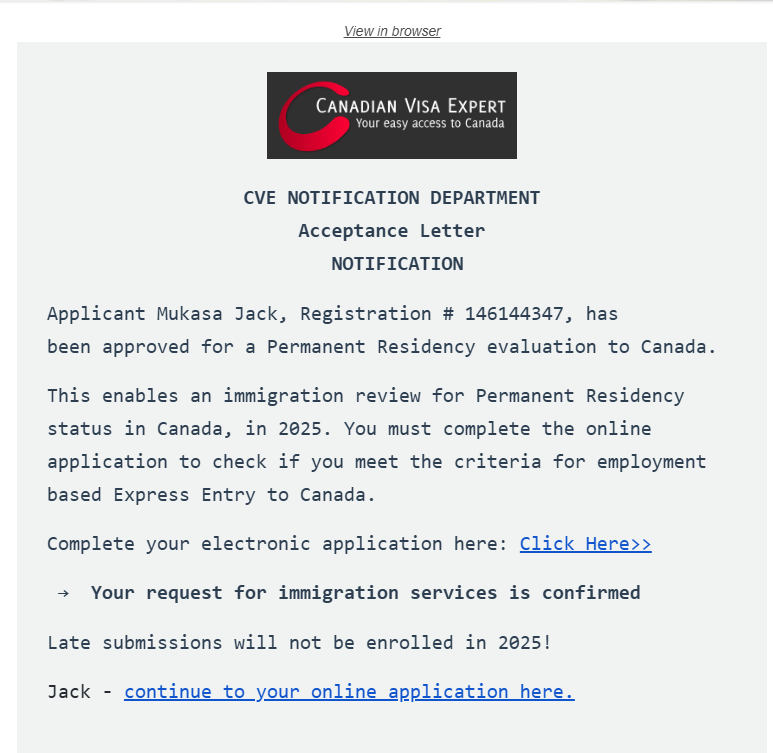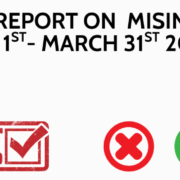False: Canadian Visa Scam. There’s no green card at the back end of the link.

Claim:
An email sent from “usafis@usafisnews.org” claims the recipient, Mukasa Jack, has been approved for a permanent residency evaluation to Canada.He is then directed to complete registration through a company called Canadian Visa Expert. The message includes a deadline, suggesting urgency, and links to a page hosted at ip.canadianvisaexpert.com.

Verdict: ❌False
Context
Why Migration Pressures Make Ugandan Audiences Vulnerable to Scams
Remittances play a critical role in Uganda’s economy and household survival. According to the Daily Monitor, Dorothy Nakaweesi reports that in 2023, Ugandans working abroad sent approximately US$1.42 billion in remittances, almost 3 per cent of GDP above revenues from major exports like coffee and tourism. This steady inflow supports essential needs, including education, healthcare, and daily sustenance, anchoring the belief that migration is a primary route to stability.
Migration is not confined to the continent. The 2023 World Bank Migration and Development Brief further highlights Uganda’s diverse migration patterns, showing that about 40% of remittances originate from the United States and the United Kingdom, where Ugandan professionals have established themselves in healthcare, finance, and education. The Middle East, particularly Saudi Arabia, the UAE, and Qatar, accounts for approximately USD 500 million (35%), primarily from Ugandans engaged in domestic work, security, and construction. Kenya alone contributes USD 100 million (7%), underscoring the growing role of intra-regional migration.
This economic reliance motivates many Ugandans, especially low-income families, to seize any perceived opportunity abroad. Scammers exploit this desperation using psychological tactics such as urgency, trust appeal, and emotional manipulation, pushing victims into making irrational decisions under pressure.
A comprehensive article on financial difficulties or low digital literacy is at greater risk because they may not recognise red flags or feel desperate enough to take risks. The article also emphasises the role of fear and cognitive overload in reducing critical thinking when confronted with fraudulent schemes, as seen in this claim.
Facts
While USAFIS is a known private immigration service entity, multiple red flags suggest that this particular email may not be legitimate.
First, the email was sent from a domain (usafis@usafisnews.org) which is unrelated to the Canadian Visa Expert official website. USAFIS, which typically refers to United States Application For Immigration Services, would have nothing to do with Canadian immigration.
The official USAFIS website is usafis.org, and their official contact email is crs@usafis.org, a completely different domain from the email in the immigration offer, which is usafis@usafisnews.org, and the official email for canadianvisaexpert.com is csr@canadianvisaexpert.com.
This mismatch strongly suggests impersonation or spoofing, a classic tactic used in phishing and scam emails.
The email includes high-pressure language (“Late submissions will not be enrolled in 2025”) and redirects users to a suspicious subdomain, Ip.canadianvisaexpert.com, which is different from the official site. The page link also offers unverifiable testimonials that do not appear on the official website.


When cross-checked with the actual Canadian Visa Expert website, there are no testimonials on the actual website, and the ones on http://ip.canadianvisaexpert.com/ are unverifiable.
Additionally, the layout differs significantly, suggesting this may be a copycat platform.
The difference in website layouts


The combination of an unofficial domain, testimonies, and disclaimers about non-registration with relevant authorities raises serious concerns. There is no evidence that this email campaign is endorsed by the U.S. government or any licensed immigration body.
Official U.S. Diversity Visa (Green Card) applications are submitted via dvprogram.state.gov, and any deviation from that portal should be treated with caution.
USAFIS and CVE are not related in any way.
Verdict:
False. While USAFIS and Canadian Visa Expert are both real companies, the use of a lookalike domain (usafis@usafisnews.org) and suspicious redirection to a questionable website (http://ip.canadianvisaexpert.com/) makes this specific email highly likely to be part of a scam or phishing attempt. It preys on individuals eager to travel or improve their financial situations.
For safe immigration guidance, always consult embassies or trusted immigration advisors before proceeding. Verify sender email domains and never pay for applications unless you have confirmed legitimacy.







